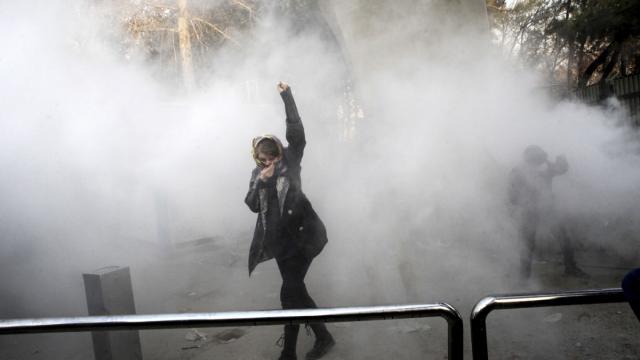
At least 12 people have died in clashes between protesters and security guards in Iran since protests erupted across the country last week, officials said on Monday, as an intervention by the president failed to quell public anger.
Protesters defied warnings by the authorities to stay away or be confronted with an “iron fist” as demonstrations, in scenes that are increasingly becoming violent, continued on Sunday evening for the fourth day, hours after the Iranian president, Hassan Rouhani, acknowledged discontent.
The demonstrations began on Thursday after opponents of the moderate president gathered in north-eastern Iran, but soon spread nationwide, escalating from initial demands over economic grievances and taking on a political dimension.
At least two people were killed in the city of Izeh, in Khuzestan province, during protests on Sunday night, according to its member of parliament, who claimed it was not clear which side fired the shots. Two others were killed in Lorestan province.
There were turbulent scenes in a number of cities across Iran, including the capital, Tehran, Karaj, Tuyserkan, Hamedan, Arak, Saveh, Amol, Sari and Qazvin. Officials said on Monday 10 people died during protests on Sunday night and at least 400 people had been arrested over the past five days.
Videos posted on social networks appeared to show riot police becoming more confrontational. Similarly, protesters are seen attacking government buildings and shattering windows in an escalation of the unrest.
Protests continued on Monday evening for a fifth day. Anti-riot police riding on motorbikes and wielding batons were unleashed on the streets of Tehran, observers said. Similar scenes were reported in other cities.
The semi-official Tasnim news agency, close to the elite Revolutionary Guards, reported that one police officer was shot dead in the city of Najafabad, in Isfahan province on Monday night. The agency claimed he was killed by one of the protesters.
Rouhani spoke with a number of parliamentarians on Monday in a meeting officials insisted was planned before the protests began. The president said: “Not all protesters are receiving orders from foreign powers, some are ordinary people who have come to streets because of their problems and sentiments.”
The president said people wanted Iran’s political atmosphere to open up, but was adamant the Islamic republic would endure the turmoil without much difficulty.
“People will confront a minority and a small group who are chanting slogans against the law and the will of people and insulting sanctities and revolutionary values, destroying public properties,” he said.
A day earlier, in his first public comments on the protests, Rouhani acknowledged discontent in a video aired on state television, saying people had constitutional right to hold protests and criticise. But he also warned that criticism was “different from violence, destruction of public property”.
The president added: “Based on the constitution and citizenship rights, people are completely free in expressing criticisms and even their protests, but at the same time, we must pay attention to the way in which criticism and protest should be made to lead to better conditions for the country and people’s lives.”
Rouhani denounced comments made by the US president, Donald Trump, who tweeted on Sunday: “The people are finally getting wise as to how their money and wealth is being stolen and squandered on terrorism.”
Rouhani said Trump had no right to express sympathy with Iranians because “a few months ago, he called the Iranian nation terrorist” and was “against the Iranian nation from head to toe”.
Trump again tweeted on Monday, saying Iran was “failing at every level” as he reiterated his support for the protesters.
“Iran is failing at every level despite the terrible deal made with them by the Obama Administration. The great Iranian people have been repressed for many years. They are hungry for food & for freedom. Along with human rights, the wealth of Iran is being looted. TIME FOR CHANGE!”
The British foreign secretary, Boris Johnson, said the UK was “watching events in Iran closely” and “people should be able to have freedom of expression and to demonstrate peacefully within the law”.
He added : “We regret the loss of life that has occurred in the protests in Iran, and call on all concerned to refrain from violence and for international obligations on human rights to be observed.”
The scale and the speed at which the protests have spread across Iran has puzzled many in the country, including reformists who are critical of the country’s political atmosphere, but are wary of any move towards regime change.
Iran blocked access to social network sites including Telegram and Instagram on Sunday, but insisted the move was temporary. In contrast to their previous handling of such protests, Iranian officials appeared to be more conciliatory, at least towards some groups of protesters, acknowledging that they have legitimate economic grievances.
The head of Iran’s judiciary, Ayatollah Sadeq Amoli Larijani, a hardline cleric, said: “Attacking mosques, public buildings, banks, is unacceptable.” He vowed the perpetrators would be prosecuted.
3 WAYS TO SHOW YOUR SUPPORT
- Log in to post comments











